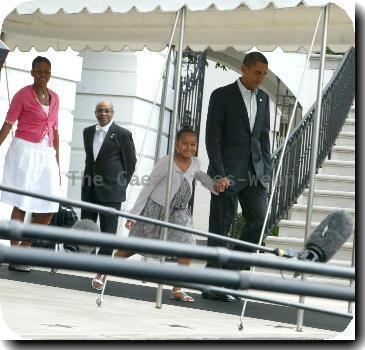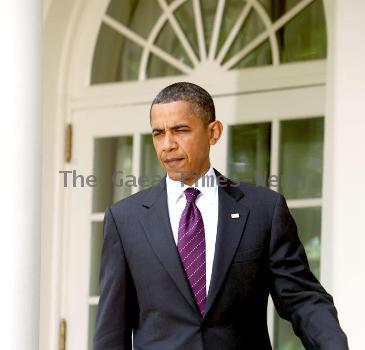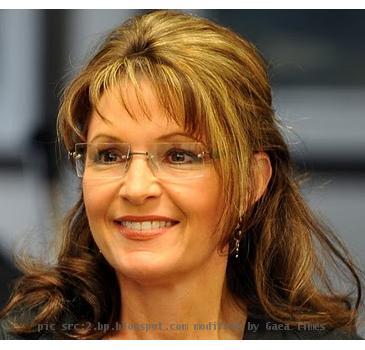Obama hopes voters’ view of John Boehner will go from ‘Who’s he?’ to ‘He’s scary’
By Charles Babington, APWednesday, September 15, 2010
Dems gamble by shifting fire from Bush to Boehner
WASHINGTON — President Barack Obama has frequently reminded Americans that the nation’s economic crisis began under George W. Bush, a largely unpopular and universally known foil. Now all but ignoring Bush, Obama is criticizing a Republican most voters have never heard of: House Minority Leader John Boehner.
The shift represents a gamble for Democrats, and a tacit acknowledgment that bashing Bush — doing so helped them win big victories in 2006 and 2008 — has basically lost its magic.
The risk for Obama and fellow Democrats is that millions of Americans will scratch their heads when they hear Boehner’s name (pronounced BAY’-nur). Democratic strategists, however, say the White House has few choices.
To highlight the alleged dangers of Republican stands on taxes, health care and other issues, “it requires giving a face to the policy,” said Jim Margolis, a media adviser for Obama and several Democratic senators.
Margolis said Democrats must show that “this isn’t just a broad-based attack on generic Republicans,” but instead is a warning about the goals and policies of the man who will become House speaker if Republicans win the majority on Nov. 2. They would have to win at least 40 seats to do so.
Republicans scoff at the strategic shift. They say it shows that Democrats are grasping at political straws and unable to ease voters’ discontent with job losses, high deficits and bank bailouts.
“It seems an admission that they haven’t been successful in trying to make this a referendum on George Bush,” said GOP strategist Kevin Madden, a former Boehner spokesman.
Because Boehner is not well-known outside Washington and his Cincinnati district, Madden said, Obama and his allies “are trying to create and poison a public profile in 50 days.”
Madden predicts the effort will fail. Voters care much less about personalities than jobs, taxes and spending, he said, and many will see Obama’s criticisms of Boehner as unseemly.
Ed Gillespie, who was a Bush White House adviser, agreed. “Obama is making himself smaller and Boehner bigger,” he said.
The shift in focus from Bush to Boehner has been dramatic.
In a speech last week in Ohio, Obama cited Boehner eight times by name, and twice as “the Republican House leader.” He did not directly mention Bush or Sen. Mitch McConnell, the Senate GOP leader.
Obama portrayed Boehner, 60, as the embodiment of unwise Republican ideas, past and future.
“There were no new policies from Mr. Boehner” when he made a major economic address, Obama said. “There was just the same philosophy that we had already tried during the decade that they were in power, the same philosophy that led to this mess in the first place: Cut more taxes for millionaires and cut more rules for corporations.”
Other cogs of the Democratic political machine joined in. The Democratic National Committee is airing TV ads linking Boehner to corporate lobbyists.
GOP aides note that House Speaker Nancy Pelosi, D-Calif., has raised more campaign money from lobbyists than Boehner has.
It may be tough for Democrats to turn the deeply tanned Boehner into the face of the Republican Party, whose better-known members include 2008 presidential nominee Sen. John McCain, former vice presidential candidate Sarah Palin and, of course, Bush.
Republicans tried to demonize Pelosi when she was on track to becoming speaker in 2006. It didn’t work. Now, they are launching a bus tour to “fire Pelosi.”
A Gallup poll in late May asked Americans their opinion of “House Republican leader John Boehner.” About a quarter of the replies were favorable, 30 percent unfavorable, 17 percent had no opinion and 27 percent had never heard of him.
The “don’t know him” category was much larger in a later Pew Research poll that offered Boehner’s name but not his title and party affiliation, which can prompt certain answers from some people. The results were 12 percent favorable, 22 percent unfavorable, 12 percent no opinion and 54 percent “never heard of him.”
That’s no reason for Obama to refrain from singling out Boehner as the personification of the changes the nation might face if Republicans take over the House, said White House senior adviser David Axelrod.
Because Boehner recently set up a “Boehner for speaker” fund and delivered a major GOP economic speech, Axelrod said, “it’s absolutely relevant to talk about him, what his ideas are, what his history is.”
Axelrod said the president will continue to note that the deep recession and Wall Street swoon began during Bush’s administration. However, he said, Obama has never wanted “to relitigate the Bush years or gratuitously invoke President Bush.”
Some lawmakers thought Boehner wobbled a little on Sunday when he said that, if he had no other choice, he would support an extension of Bush’s major tax cuts for all but the wealthiest 2 percent or 3 percent of Americans. The comment seemed at odds with other top Republicans’ insistence that all the tax cuts remain in place, which has prompted a standoff in Congress.
Boehner’s aides dismissed the hubbub, saying their boss made it clear he supports that stand. Obama, meanwhile, says that is precisely what Americans need to know.
“Let me be clear to Mr. Boehner and everybody else,” Obama said in Ohio. “We should not hold middle-class tax cuts hostage any longer,” and Congress should vote to “give tax cuts to every American making $250,000 or less,” he said.
Come November, Boehner’s stature and status may matter little in races to fill 435 House seats, 37 Senate seats and 37 governor’s seats. People generally vote for or against someone on the ballot, without great regard to endorsements by others, Margolis said.
“Most campaigns will not be hugely impacted by these outside personalities,” he said.
That won’t stop Obama and other Democrats from continuing to demonize Boehner, the leader of a party that offers few obvious targets.
As Axelrod said with a slight edge in his voice Tuesday, “He’s getting better known all the time.”
Tags: Barack Obama, District Of Columbia, North America, Political Organizations, Political Parties, Public Opinion, Sarah palin, United States, Washington



